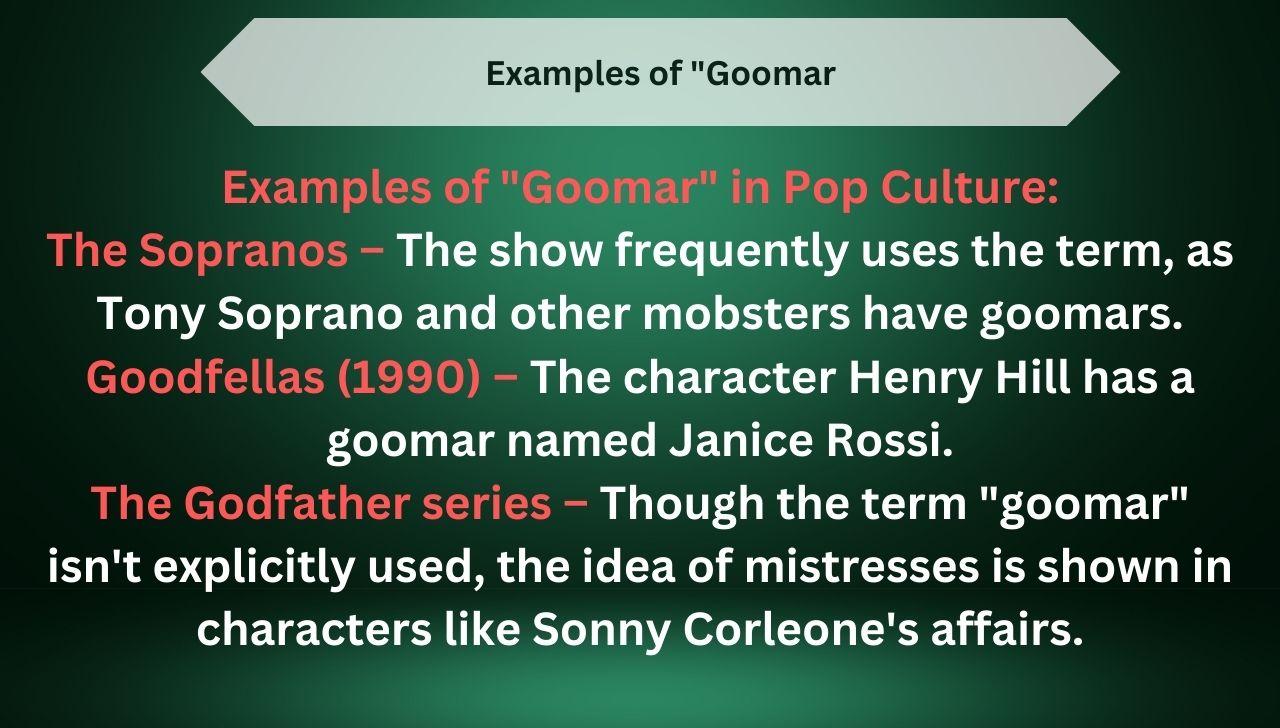Goomar – Its Meaning, Origin and Usage
The Meaning of “Goomar
“Goomar” is American-Italian slang for a mistress, usually linked to mobsters. It refers to a woman who, while not married to the mobster, plays the role of a mistress. This includes companionship, intimacy, and sometimes even household tasks like cooking and cleaning. These relationships are kept secret to avoid mixing with the mobster’s official family life. A Goomar usually gets quite a bit in return for her loyalty and secrecy. This includes fancy gifts like clothes, jewelry, and other high-end items. These gifts are ways for the mobster to show appreciation and keep the relationship going.
The setup is such that the Goomar rarely, if ever, meets the mobster’s family. This helps keep things complicated and private. The word “Goomar” means more than just a mistress. It carries cultural shades that mix feelings and practicality. These relationships work in a complex mix of secrecy, control, and give-and-take. This relationship, often depicted in movies, adds to our understanding of the role in American-Italian culture.

Examples of “Goomar
In movies and TV shows, goomar relationships are often highlighted. For instance, in “The Sopranos,” Tony Soprano has several goomars. These complicated relationships offer him emotional and physical comfort outside his marriage. He often meets them secretly and even gives them money, showing how hidden these relationships are.
Examples of “Goomar” in Pop Culture:
- The Sopranos – The show frequently uses the term, as Tony Soprano and other mobsters have goomars.
- Goodfellas (1990) – The character Henry Hill has a goomar named Janice Rossi.
- The Godfather series – Though the term “goomar” isn’t explicitly used, the idea of mistresses is shown in characters like Sonny Corleone’s affairs.
Examples of “Goomar” in a Sentence:
- “Johnny’s wife knew about his goomar, but she never said anything.”
- “In the mafia world, having a goomar was almost expected, even if it led to trouble at home.”
- “He took his goomar to the club, but kept her away from his wife’s circle of friends.”
These stories make it easier for us to understand such relationships’ social and emotional complexities. They show us the cultural impact and the norms in certain groups, pointing out how goomars can be both helpful and a source of trouble. Through these characters, the role of the goomar adds a deep element to tales about power, secrecy, and identity.

Check This Out – Glizzy – Its Meaning, Origin and Usage
Other Ways to Say “Goomar
Language evolves, and so do the ways we describe things. Whether you’re looking for a subtle term or a bold expression, this list gives you fresh alternatives to “goomar.” Some are slang, some are old-school, and others carry a playful twist. Use them wisely, and you might just add a new phrase to your vocabulary.
- Side piece
- Mistress
- Lovebird
- Secret flame
- The other woman
- Hidden rose
- Sweet escape
- Backdoor lover
- Shadow queen
- Twilight affair
- Forbidden fruit
- Midnight muse
- Stolen kiss
- Undercover love
- Secret enchantress
- Rendezvous girl
- The kept one
- Silent passion
- Veiled desire
- Scarlet muse
- Discreet darling
- Mysterious flame
- The quiet affair
- Low-key lover
- Hidden gem
- Stolen heart
- Off-the-record romance
- Midnight rendezvous
- Cloaked companion
- Enigma in heels
If you’re thinking of something less serious, you might hear “side-piece.” This term points to a more casual setup, mainly just for sex, without the extra layers of support or commitment you get with a “mistress.” Now, if you go even more casual, you’ll come across phrases like “bit on the side” or “piece of ass.” These are pretty blunt and focus mainly on the physical part of things, not really on feelings. On the other hand, “sweetheart” sounds a lot nicer and affectionate, but it might give the wrong impression about what’s going on.
Origins of “Goomar
Let’s look into the word “Goomar.” It comes from the Italian word “comare,” meaning godmother or a close family friend. This word goes back even further to the Latin “commater,” which combines “com-” (with) and “mater” (mother). Initially, it pointed to a close, almost family-like bond.
But its meaning changed dramatically when “comare” became “Goomar” in American-Italian slang.
Here’s what happened: In Italian-American communities, especially those influenced by the mafia and organized crime, “Goomar” started to mean a mistress, not just any mistress, but one linked with mobsters. They were more than secret lovers; they provided comfort and support, often away from the public eye.
This shift became even more known through movies and TV shows like “Goodfellas” and “The Sopranos.” In these stories, “Goomar” refers to the mob members’ girlfriends, separate from their wives, highlighting the secretive side of their relationships.
Conclusion
Simply put, “goomar” has evolved from innocent Italian origins to a complex term in American-Italian slang, especially in stories about the mob. It shows the complicated nature of secret, powerful, emotional affairs outside marriage. The way goomars are depicted in movies and TV has made the word more common and has also thrown light on more significant issues like loyalty, personal identity, and the secret lives of those in the mob world.
In simple terms, when we talk about “goomar,” we’re diving into a world that mixes personal relationships with the harsh realities of crime families. It’s more than just a word; it’s a peek into hidden stories of love and power.







